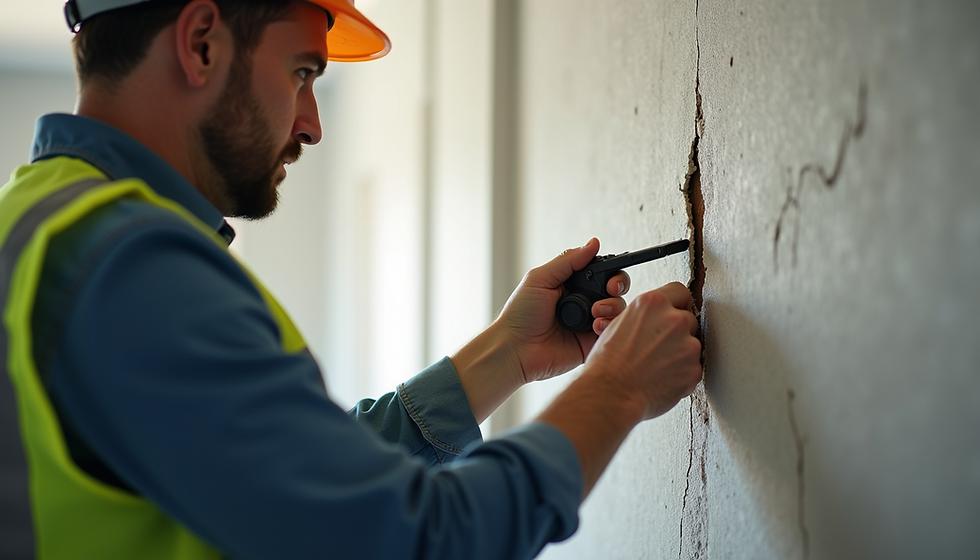What You Should Know Before Hiring a Home Inspector
- John Gallagher
- Jun 23, 2025
- 4 min read
When you're buying a home, the importance of a comprehensive home inspection cannot be overstated. A licensed home inspector plays a critical role in helping you understand the condition of the property you are considering. But before you hire someone for this task, there are several key points you need to know.
Understanding the Role of Licensed Home Inspectors
Licensed home inspectors assess a property’s condition and identify potential issues, which can save you a lot of time and money in the long run. They provide detailed reports on various aspects of the home, including structural integrity, plumbing, electrical systems, roofing, and more.
They are trained to recognize not just obvious problems, but also hidden ones that may not be apparent to the untrained eye. For instance, they often use advanced tools like thermal imaging cameras to detect moisture behind walls or under flooring.

A thorough inspection report can be a vital tool for negotiations, allowing you to address repairs before finalizing the purchase. Without an expert's eye, you might overlook significant issues that could lead to costly repairs later on.
What to Look for in Licensed Home Inspectors
When hiring a home inspector, there are several factors to consider to ensure you are choosing someone qualified:
Certification and Experience: Ensure the inspector is licensed and has received the necessary certifications. Most states require inspectors to pass an exam and complete continuing education courses. Look for professionals who have significant experience, preferably with many inspections under their belt.
Sample Reports: Ask for a sample inspection report. This will give you insights into how thorough they are in their inspections, what kind of issues they typically flag, and how they communicate their findings. A good report should be clear, straightforward, and comprehensive.
References and Reviews: Seek out references from past clients or check online reviews and ratings. A reputable inspector should have positive feedback and testimonials. Don’t hesitate to ask for a list of past clients to contact.
Specialization: Some inspectors specialize in certain areas, such as historic homes, commercial properties, or energy efficiency. Choose an inspector whose expertise aligns with your specific needs.

Questions to Ask Your Potential Inspector
Engaging in a dialogue with your potential inspector is crucial. Prepare a list of questions before you meet. Here are some important ones:
What does your inspection cover? Ensure the inspector will evaluate all critical areas of the home, including the roof, foundation, plumbing, electrical systems, and appliances.
How long will the inspection take? Most inspections take 2 to 4 hours, depending on the home’s size. If the inspector rushes, it may raise concerns about their thoroughness.
Do you encourage clients to be present during the inspection? Being there allows you to ask questions on the spot and understand more about the condition of the home.
What happens if you find major issues? It’s important to know how they will communicate problems to you. Reliable inspectors will provide practical solutions or recommendations for the next steps.
Preparing for the Home Inspection
Once you have hired a licensed home inspector, preparation is key for both you and the inspector. Here are steps to organize a smooth inspection process:
Make Access Easy: Ensure that all areas of the home are accessible. This includes attics, basements, and crawl spaces. Clear away any items that might block access to essential systems.
Provide Documentation: Share any past maintenance records or warranties on appliances and systems. Such information could be beneficial during the inspection process.
Ask Your Real Estate Agent: Your agent can help coordinate the inspection and may provide valuable insights into what to note during the evaluation.

Reading and Understanding the Inspection Report
Once the inspection is complete, you should receive a detailed report of your home's condition. Understanding this document is essential:
Familiarize Yourself with Terminology: Some reports may include technical jargon. Don’t hesitate to ask your inspector for clarification on any terms or findings you don’t understand.
Prioritize Issues: Look for items categorized as “urgent” or “major concerns” which need immediate attention. Understanding the severity of issues helps inform your next steps, whether it’s negotiations or repairs.
Comparative Analysis: If purchasing in a competitive market, use the report to identify areas of strength and weakness in your offer. The inspection can provide leverage in negotiations to address foundational concerns or repairs.
Final Thoughts on Hiring Licensed Home Inspectors
Hiring the right home inspector can make a significant difference in your home-buying experience. A qualified inspector will give you peace of mind, identifying issues that could lead to costly repairs down the line.
Remember, the more informed you are, the better equipped you will be to make decisions regarding your home purchase. Do your research, ask the right questions, and don’t shy away from getting clarifications along the way.
Taking these steps before hiring licensed home inspectors will ensure that you not only get an expert in the field, but also someone who will look out for your best interests. Remember, a little due diligence can save you a lot of stress in your future home.
As you embark on your journey to homeownership, keep these insights in mind and choose wisely. Happy home hunting!




Comments